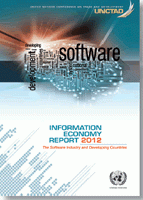
The Information Economy Report 2012: The Software Industry and Developing Countries is the seventh in the flagship series published by the United Nations Conference on Trade and Development (UNCTAD).
In the 2012 edition, special attention is given to the role of software capabilities in accelerating progress towards a more inclusive information society.
Key issues covered include:
- The link between software capabilities and development
- Global and regional trends in production, spending, trade, investment, venture capital and employment in the software sector
- The evolving ICT landscape and its impact on software production patterns
- Trends and implications related to free and open source software (FOSS)
- An analysis of the market orientation of software production in developing countries
- Country case studies
- Policy recommendations on how governments and their development partners can better leverage software for development and strengthen national software systems
The Information Economy Report 2012 finds that, because software is increasingly permeating societies at all levels of development and activity, it is becoming more important for countries to develop the technological capabilities needed to adopt and adapt existing software solutions, and eventually to innovate. Software and service activities represent an opportunity for developing countries, thanks to the low capital entry requirements, the sector's high-value, high-growth nature and knowledge-rich profile. Due to changes in the ICT landscape, even small-scale developers in developing countries can now participate in software development and production, for example in the area of mobile applications. The Report suggests that there is considerable room for developing countries to make better use of the software potential.
The Report introduces the concept of the national software system. It emphasizes that domestic software producers and users are greatly influenced by the quality and affordability of ICT infrastructure, access to relevant human resources and capital, the legal framework, an enabling business infrastructure, as well as by the links with software networks in the rest of the world.
Governments play a central role in the national software system. Overall, the competitiveness of the system is affected by the national vision, strategy and government policies which should nurture software capabilities and the system as a whole. In particular, Governments are important users of software (notably through e-government and public procurement activities) and they strongly influence most of the enabling factors of the system.
The Information Economy Report 2012 offers several policy recommendations to governments, such as:
- "
- To take active part in fostering their national software systems.
- To tailor software development strategies to their specific contexts, based on consultations and partnerships with relevant stakeholders.
- To integrate software strategies into broader development plans
- To strike a balance between domestic and export market promotion related to software
- To adapt education and training schemes to the new ICT landscape
- To encourage technological upgrading in enterprises, and adoption of relevant international standards and certifications
- To facilitate the strengthening of developer communities
- To give adequate attention to FOSS, especially in public procurement
- To seek the support of development partners in training, application development, support to the strengthening of legal and regulatory frameworks, supporting IT/software associations and clusters, meetings of developers, software SME development and more
- To leverage South-South cooperation where appropriate
The Information Economy Report 2012 explores various examples of software development initiatives by individual countries and groups of countries.
Among the cases cited are:
- Software trends in the BRIC countries
- Nigeria's new software strategy
- The emerging Android ecosystem in Sri Lanka
- The Malaysian Public Sector Open Source Software Programme
- The eGovFrame platform of the Republic of Korea
- Software for sustainable development in Lao PDR
- The Free Software and Open Source Foundation for Africa
- A global UNCTAD/WITSA survey of national IT/Software Associations
- Locally developed software to improve farmers' access to information in Bangladesh
- Software promotion in Argentina
In the Statistical Annex of the Report, UNCTAD presents among other things international data on software spending, exports and employment.
For more information about UNCTAD´s work on ICT for Development under the Division on Technology and Logistics, please contact:
ICT Analysis Section
Division on Technology and Logistics
Telephone: +41 22 917 55 91
Fax: +41 22 917 00 52
e-mail: ict4d@unctad.org www.unctad.org/ict4d


